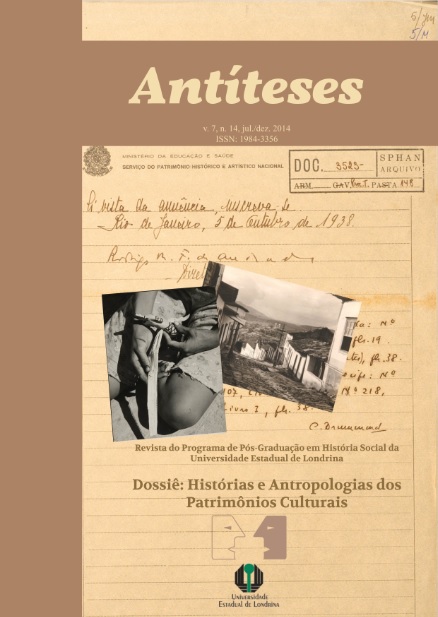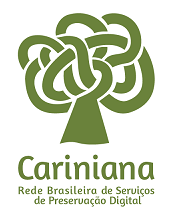The city of London on the songs of experience from William Blake: an interpretation of social changes occurred in english industrial society in the last decades of the eighteenth century
DOI:
https://doi.org/10.5433/1984-3356.2014v7n14p469Keywords:
William Blake, Religiousness, Industrial society, Literature, RomanticismAbstract
This article intends to analyze some of the social changes in England in the last decades of the Eighteenth century from the poem in London that is in the work Songs of Innocence and of Experience of the poet and engraver William Blake - an author inserted in the English Romantic movement. His work has been marked, as a whole, by mystical thought culminating in the creation of a cosmogony able to explain, according to the author, the human condition. We can notice in the poems of William Blake his vision about the time in which he lived, his interpretation of reality can elucidate some of the experiences of English society in the transition between the Eighteenth and Nineteenth centuries: that was part of the process of industrialization, the increasing displacement of reason as center of thought and heard the echoes of the French Revolution. Songs of Innocence and of Experience contains the foundations of thought developed over the later works of William Blake - expresses social transformations he lived in a universe where politics, religion and art intertwine in building a peculiar interpretation of the formation of modern industrial society.Downloads
Download data is not yet available.
References
FONTES
BÍBLIA. Português. Tradução de Ivo Storniolo, Euclides Martins Balancin e José Luís Gonzaga do Prado. São Paulo: Sociedade Bíblica Católica Internacional e Paulus Ed.,1990.
BLAKE, William (1757-1827). William Blake: poesia e prosa selecionadas/ Edição bilíngüe. Introdução, seleção, tradução e notas Paulo Vizioli. São Paulo: Nova Alexandria, 1993.
ERDMAN, David V. (ed.). The Complete Poetry and Prose of William Blake. New York: Anchor Books, 1988.
ERDMAN, David V. (ed.). The Illuminated Blake: William Blake's Complete Illuminated Works with a Plate-by-Plate Comentary by David V. Erdman. New York: Dover Publications, 1992.
BIBLIOGRAFIA
ALVES, Andréa Lima. "A Oposição é Verdadeira Amizade": Imagem poética e pictórica no livro O Matrimônio do Céu e do Inferno de William Blake. Campinas-SP, 2001. 216 p. Dissertação de Mestrado. Universidade Estadual de Campinas, Instituto de Estudos da Linguagem.
ALVES, Andréa Lima. A interação entre texto e ilustração nos illuminated books de William Blake sob o prisma da obra America: A Prophecy. Campinas-SP, 2007. 274 p. Tese de Doutorado. Universidade Estadual de Campinas, Instituto de Estudos da Linguagem.
BAUMER, Franklin L. "O Mundo Romântico". In: O Pensamento Europeu Moderno, 2º volume. Tradução de Maria Manuela Alberty. Lisboa: Edições 70, Lda., 1990.
EAVES, Morris; Robert N. Essick & Joseph Viscomi (eds.). The William Blake Archive. http://www.blakearchive.org
ERDMAN, David V. Blake: Prophet Against Empire. Princeton: Princeton University Press, 1954.
FRYE, Northrop. Fearful Symmetry. Princeton: Princeton University Press, 1990.
HILL, Christopher. A Bíblia inglesa e as revoluções do século XVII. Tradução de Cynthia Marques. Rio de Janeiro: Civilização Brasileira, 2003.
HILL, Christopher. A Revolução Inglesa de 1640. Tradução de Wanda Ramos. Lisboa: Presença, 1985.
HILL, Christopher. O Mundo de Ponta-Cabeça: idéias radicais durante a revolução Inglesa de 1640. Tradução de Renato Janine Ribeiro. São Paulo: Companhia das Letras, 2001.
HOBSBAWM, Eric. J. Da Revolução Industrial inglesa ao imperialismo. Tradução de Donaldson Magalhães Garschagen. Rio de Janeiro: Forense Universitária, 2009.
KORNER, Simon. William Blake's London. Disponível em: http://21stcenturysocialism.com/article/william_blakes_london_01594.html Acesso em: 17/02/2014.
LINEBAUGH, Peter. Todas mas montanhas atlânticas estremeceram. in Revista Brasileira de História, São Paulo, ANPUH, n. 6, setembro de 1993.
LOURENÇO, Isabel Maria Graça. The William Blake Archive: Da Gravura Iluminada à Edição Eletrónica. Coimbra, 2009. 490 p. Tese de Doutorado. Faculdade de Letras da Universidade de Coimbra, na área de Línguas e Literaturas Modernas.
LÖWY, Michael. Romantismo e Política. Disponível em: www.unipam.edu.br/.../RomantismoepolÃtica-MichaelLowy.doc Acesso em: 26/08/2010.
LÖWY, Michael; SAYRE, Robert. Revolta e Melancolia: O romantismo na contramão da modernidade. Petrópolis: Vozes, 1995.
THOMPSON, E. P. (1924-1993). A formação da classe operária inglesa. São Paulo: Paz e Terra, 2004.
THOMPSON, E. P. (1924-1993). Os Românticos - A Inglaterra na Era Revolucionária. Tradução de Sérgio Moraes Rêgo Reis. Rio de Janeiro: Civilização Brasileira, 2002.
THOMPSON, E. P. (1924-1993). Whitness against the Beast: William Blake and the moral law. New York: The New Press, 1994.
VIGÁRIO, Sílvia Manuela Pereira. Crianças sem Infância: O Trabalho Infantil na Indústria Têxtil e os Limpa-Chaminés (1780-1878). Braga, 2004. 148 p. Dissertação de Mestrado. Universidade do Minho, Instituto de Letras e Ciências Humanas.
WILLIAMS, Raymond. Cultura e Sociedade - 1780-1950. Tradução de Leônidas H. B. Hegenberg Octanny Silveira da Mota e Anísio Teixeira. São Paulo: Companhia Editora Nacional, 1969.
WILLIAMS, Raymond. O Campo e a Cidade: na história e na literatura. São Paulo, Companhia das Letras, 1989.
BÍBLIA. Português. Tradução de Ivo Storniolo, Euclides Martins Balancin e José Luís Gonzaga do Prado. São Paulo: Sociedade Bíblica Católica Internacional e Paulus Ed.,1990.
BLAKE, William (1757-1827). William Blake: poesia e prosa selecionadas/ Edição bilíngüe. Introdução, seleção, tradução e notas Paulo Vizioli. São Paulo: Nova Alexandria, 1993.
ERDMAN, David V. (ed.). The Complete Poetry and Prose of William Blake. New York: Anchor Books, 1988.
ERDMAN, David V. (ed.). The Illuminated Blake: William Blake's Complete Illuminated Works with a Plate-by-Plate Comentary by David V. Erdman. New York: Dover Publications, 1992.
BIBLIOGRAFIA
ALVES, Andréa Lima. "A Oposição é Verdadeira Amizade": Imagem poética e pictórica no livro O Matrimônio do Céu e do Inferno de William Blake. Campinas-SP, 2001. 216 p. Dissertação de Mestrado. Universidade Estadual de Campinas, Instituto de Estudos da Linguagem.
ALVES, Andréa Lima. A interação entre texto e ilustração nos illuminated books de William Blake sob o prisma da obra America: A Prophecy. Campinas-SP, 2007. 274 p. Tese de Doutorado. Universidade Estadual de Campinas, Instituto de Estudos da Linguagem.
BAUMER, Franklin L. "O Mundo Romântico". In: O Pensamento Europeu Moderno, 2º volume. Tradução de Maria Manuela Alberty. Lisboa: Edições 70, Lda., 1990.
EAVES, Morris; Robert N. Essick & Joseph Viscomi (eds.). The William Blake Archive. http://www.blakearchive.org
ERDMAN, David V. Blake: Prophet Against Empire. Princeton: Princeton University Press, 1954.
FRYE, Northrop. Fearful Symmetry. Princeton: Princeton University Press, 1990.
HILL, Christopher. A Bíblia inglesa e as revoluções do século XVII. Tradução de Cynthia Marques. Rio de Janeiro: Civilização Brasileira, 2003.
HILL, Christopher. A Revolução Inglesa de 1640. Tradução de Wanda Ramos. Lisboa: Presença, 1985.
HILL, Christopher. O Mundo de Ponta-Cabeça: idéias radicais durante a revolução Inglesa de 1640. Tradução de Renato Janine Ribeiro. São Paulo: Companhia das Letras, 2001.
HOBSBAWM, Eric. J. Da Revolução Industrial inglesa ao imperialismo. Tradução de Donaldson Magalhães Garschagen. Rio de Janeiro: Forense Universitária, 2009.
KORNER, Simon. William Blake's London. Disponível em: http://21stcenturysocialism.com/article/william_blakes_london_01594.html Acesso em: 17/02/2014.
LINEBAUGH, Peter. Todas mas montanhas atlânticas estremeceram. in Revista Brasileira de História, São Paulo, ANPUH, n. 6, setembro de 1993.
LOURENÇO, Isabel Maria Graça. The William Blake Archive: Da Gravura Iluminada à Edição Eletrónica. Coimbra, 2009. 490 p. Tese de Doutorado. Faculdade de Letras da Universidade de Coimbra, na área de Línguas e Literaturas Modernas.
LÖWY, Michael. Romantismo e Política. Disponível em: www.unipam.edu.br/.../RomantismoepolÃtica-MichaelLowy.doc Acesso em: 26/08/2010.
LÖWY, Michael; SAYRE, Robert. Revolta e Melancolia: O romantismo na contramão da modernidade. Petrópolis: Vozes, 1995.
THOMPSON, E. P. (1924-1993). A formação da classe operária inglesa. São Paulo: Paz e Terra, 2004.
THOMPSON, E. P. (1924-1993). Os Românticos - A Inglaterra na Era Revolucionária. Tradução de Sérgio Moraes Rêgo Reis. Rio de Janeiro: Civilização Brasileira, 2002.
THOMPSON, E. P. (1924-1993). Whitness against the Beast: William Blake and the moral law. New York: The New Press, 1994.
VIGÁRIO, Sílvia Manuela Pereira. Crianças sem Infância: O Trabalho Infantil na Indústria Têxtil e os Limpa-Chaminés (1780-1878). Braga, 2004. 148 p. Dissertação de Mestrado. Universidade do Minho, Instituto de Letras e Ciências Humanas.
WILLIAMS, Raymond. Cultura e Sociedade - 1780-1950. Tradução de Leônidas H. B. Hegenberg Octanny Silveira da Mota e Anísio Teixeira. São Paulo: Companhia Editora Nacional, 1969.
WILLIAMS, Raymond. O Campo e a Cidade: na história e na literatura. São Paulo, Companhia das Letras, 1989.
Downloads
Published
2014-12-19
How to Cite
DUARTE, Flavia Maris Gil. The city of London on the songs of experience from William Blake: an interpretation of social changes occurred in english industrial society in the last decades of the eighteenth century. Antíteses, [S. l.], v. 7, n. 14, p. 469–491, 2014. DOI: 10.5433/1984-3356.2014v7n14p469. Disponível em: https://ojs.uel.br/revistas/uel/index.php/antiteses/article/view/18154. Acesso em: 11 feb. 2026.
Issue
Section
First Steps
License
Copyright (c) 2014 Antiteses

This work is licensed under a Creative Commons Attribution 4.0 International License.
The journal reserves the copyright on the contributions published, without material compensation for the author, and may make them available online in Open Access mode, through its own system or other databases; you can also make normative, orthographic and grammatical changes in the originals, in order to maintain the cultured standard of the language, with the final consent of the authors. The opinions expressed by the authors are their sole responsibility.










